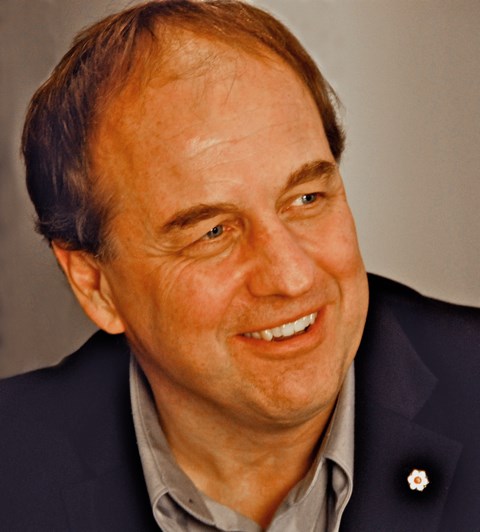Eco-Fashion Week Vancouver is happening now, Vancity! Go HERE to read all about it.
The University of Victoria's Dr. Andrew Weaver was on the committee that won the 2007 Nobel Peace Prize (along with Al Gore) on the issue of climate change. As Eco-Fashion Week's keynote speaker, he will be addressing climate change and the fashion industry tomorrow morning at 10:00 am at Creekside Community Centre. For ticket information, go HERE.
How did you get involved with Eco-Fashion Week? It doesn't seem like what you do has much to do with fashion.
I read an interesting article by David Suzuki in my local paper, The Saanich News, where he was talking about Myriam Laroche [the founder of Eco-Fashion week - RF] and her efforts to raise awareness in the fashion industry in respect to ecological issues. I thought, “Well, that's kinda cool.”
I use Facebook, like she does, and we connected that way. I'm not involved in the fashion industry and I am probably the last person ever you would want to use as a model, but she asked me if I would like to come and speak and I agreed. I have spoken on the issue of climate change to many different people – from schoolchildren to politicians to those in industry – a real diversity of audiences. This is a very influential group so I was delighted by the opportunity. People look to fashion as a trendsetter and if you have fashion being done in a sustainable way and you make that cool then you can set a trend. I think what they're doing is wonderful and I am happy to support them.
You are more geared towards “climate change,” is that right?
I'm a scientist, that's right.
And ... a Nobel Peace Prize winner.
I was part of the intergovernmental panel on climate change and that organization received the Nobel Peace Prize with Al Gore. I don't like to say, “I got it” because I didn't, the organization got it.
You're very humble and modest. If I was in your position it would be different. I would tell everyone I knew that I won a Nobel Peace Prize.
Well, you can't do that. My colleagues and I know exactly how it rolls in all of this. And I have to work with my colleagues and they would not respect me if I were to say that and I wouldn't respect them if they said that. We are a team.
That is lovely and beautiful and completely indicative of why I will not be winning the Nobel Peace Prize anytime soon.
(Laughs) The issue of environmental change is really an embracing scientific issue. Look at what is going on in Alberta with the tar sands – consider the degradation of the environment, the loss of bio-diversity, the health issues of First Nations people. We are extracting a resource that is actually causing the climate change problem. If we reduce the demand for the resource then you have co-benefits. So there are many issues embraced by global warming and you can see how it is an over-arching issues. This is a part of the talk I am giving which actually will give some sense of urgency and I think the fashion industry really has a crucial role to play in that. Wouldn't it be really cool if sustainable clothing made from bamboo was suddenly the trend that was set? These are the types of things that can happen when you have leaders in a particular area that are sustainable environmentally.
This is how change happens. It starts slowly, and then very rapidly. It's the Tipping Point idea. Look at the cell phone, or even the internet for example – everyone has it now. But this is a tough one. There's an awful lot of infrastructure in that system that needs to change. And it will change. It's happening slowly now but there will be a tipping point at some stage.
There are two things going on with fashion but they correlate. There is the social – do I feel a responsibility for buying a 10-pack of really cheap socks at a big box store made by children in a far-off country? And the environmental – they have to get here, from wherever it is they are made, and that has a carbon footprint attached to it. We're such a disposable culture. When was the last time anybody darned a pair of socks? And why are organic cotton socks so expensive?
I don't have all the answers but I can tell you that they're not cheap because they're not everywhere. There's always a supply and demand thing.
So you're talking about “the invisible hand of fashion.”
Let's suppose that we move nationally and internationally to put a price on emissions. The only part around us that we treat as an unregulated dumping ground is the atmosphere. We share the consequences of that globally. If we start putting a price on emissions what we'll start to see is people who are shipping stuff from afar have to pay for the cost of that. So, for example, your socks from China will have a cost associated with them from the emissions resulting from transport. It would actually make it more cost-effective to produce a lot of these things locally. So again, there's the co-benefit of pricing emissions.
The larger thing is the egocentric culture we have – it's all about “me, what's good for me?” vs the fact that we live on a finite planet. By definition, a finite system can not have unbounded growth and unbounded consumption. There has to come a limit at the top. It's changing behaviour to recognize that a limit does exist and that if we as a society believe that there is some sort of intergenerational equity that needs to come to the forefront, that is that we actually owe something to future generations that will allow them to have the same quality of life that we have today, then we have to act and deal with this issue now. I'm an optimist – we will change. It's just a matter of time.
It's all so fascinating – look at leather used in shoes, for example. Leather comes from cows, which need to be fed. Growing food for cows uses resources and cows create methane which isn't great for the atmosphere vs. shoes made from petroleum products which are inherently bad for the planet, so... what's the answer?
I don't know! But I do know that the discussion needs to be held. I think it's wonderful that we can have those discussions. That would be a fascinating discussion – leather vs. petroleum. I can think of pros and cons for both sides. You can have the discussion, and it will be heated, but it's a healthy discussion that society needs to have.
I think what is interesting is that we're talking not just in terms of the ecology of the planet but in terms of commerce. An “eco-currency.”
Exactly, exactly!
Do I get a Nobel Prize for that, for “eco-currency”?
I think you do if you coin it! Let me just type it into Google... it's a wonderful phrase...
Ohhhh... it's in Wikipedia.
Let's get to the core of what is really what Eco-Fashion Week is all about; that you may have the opportunity to stop people from wearing and making polyester, rayon, and other nasty unnatural synthetics.
I don't want to influence people to do one thing or another, I want to get them to think about the consequences of their choices and actions. I don't have the answers to everything, no scientist does. Scientists, by definition, can inform the debate but can't answer it. I can raise the issue and inform and let others debate the consequences. That, I think, is my role.
Stargate Universe's Elyse Levesque, clearly ruminating over the green and fashion faux pas inherent in Ed Hardy-anything. Raphael Mazzucco photo.
So we need to get your board of smart, scientist, Nobel Prize winners of the world together with the Anna Wintours of the world to save the planet. An eco-fashion revolution, where we can say "good-bye!" to things like rhinestones and faux gold paint stuck on Ed Hardy shirts. Those are good for no one. A fashion and green faux pas.
(Laughs.) I'm hoping that I can see some runway shoes with some really cool stuff that you never even think of. I'm not a fashion designer, I'm just a science guy! The key is to make it trendy. Once that happens and people want it, they will demand it and that's when the tipping point occurs.
I don't know what goes into making an Ed Hardy rhinestone but I suspect that if those who make them think about it – does the rhinestone come from some child making it in India? Could it be made from a local, natural pebble instead? - that's when change can happen.
Look at the outcry against a little thing like plastic shopping bags. Nobody gets plastic bags now. They all show up with their own!
Society has to find more of these examples and build on them. One day it'll be cool to wear sustainable fibers and wear clothing that was produced locally. It'll be especially cool if the most respected people in the world are doing that, too. It's so exciting to be a part of an event like this, one that has the potential to be transformational.




